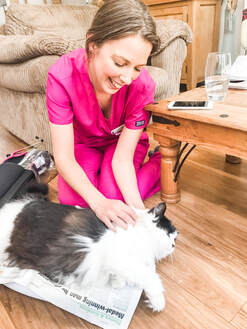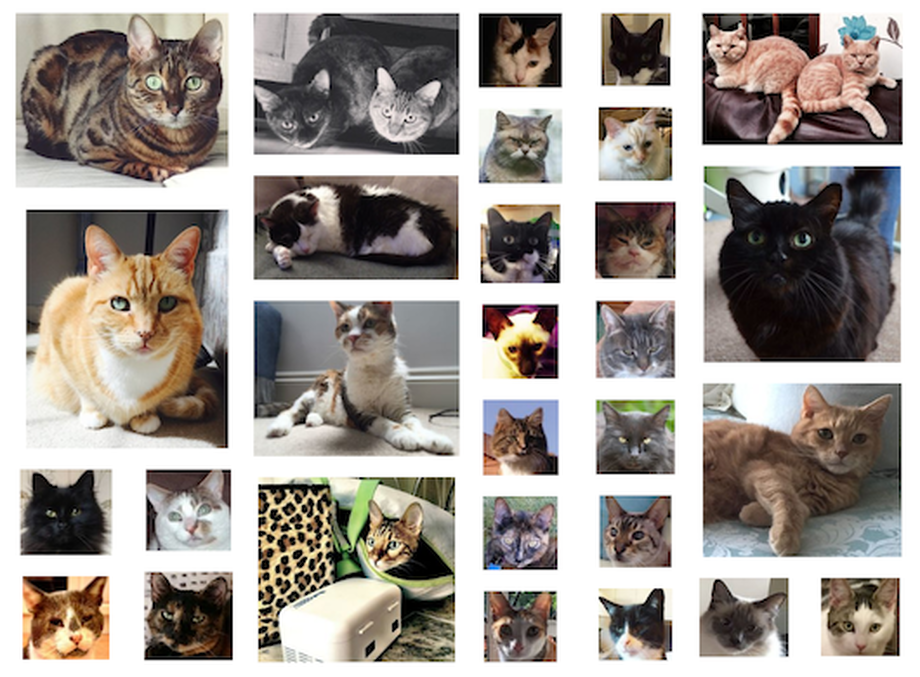The Cat Vet
|
Welcome to my vet clinic with a difference!
|
Share:
|
|
When you truly understand what makes cats tick & you know just how much they mean to the humans that love them, you realise how vital it is for all cats to have access to cat friendly, gold standard routine veterinary care in their home environment.
As a new graduate vet, I was struck by I how many cats missed out on routine veterinary care because their humans avoided trips to the vet. It really bothered me that this meant treatable diseases were being missed or picked up when it was too late, when I could do a lot less to help them.
I quickly saw that the reason was staring the vet profession in the face! Most of the cats that actually made it into the clinic, were either panicked or seemingly amenable but with subtle body language that was telling me they were really quaking on the inside and frozen with fear. Not all vet practices and staff are geared (or trained) to think like a cat so as natural cat person and lover, I found working in these conditions as stressful as the cats!
I quickly saw that the reason was staring the vet profession in the face! Most of the cats that actually made it into the clinic, were either panicked or seemingly amenable but with subtle body language that was telling me they were really quaking on the inside and frozen with fear. Not all vet practices and staff are geared (or trained) to think like a cat so as natural cat person and lover, I found working in these conditions as stressful as the cats!
|
I frequently saw caring, committed cat people who I knew would do anything to help their cat, battling with their conscience when contemplating a trip to the vet. Nobody wants to put a scared loved one through that sort of stress on a single occasion, let alone regular visits for longterm illness and treatment monitoring.
Then there are the poor scaredy cats that have learned that lashing out with teeth and claws stops you and the vet from bothering them any further. Even the cats that make it into a bricks and mortar vet practice don’t always get the best care because they're "too difficult" or what I prefer to call, too scared and misunderstood!
|
Too many vets work hectic schedules with not enough time allotted to each cat. It became clear to me that there was a better way to give more cats access to compassionate, cat friendly regular vet care. So I set up The Cat Vet Home Visiting Clinic, and devoted it to literally going the extra mile for each and every cat, providing felines and their doting owners with premium cat friendly veterinary care and advice without leaving the comfortable surroundings of home.
The Cat Vet offers a home visiting vet service for cats just outside of London, near Windsor on the beautiful Berkshire, Surrey & Hampshire borders
Not local? No problem!
Join me in an online masterclass instead!
Your cats can still benefit from all the wisdom and expert practical tips I share in the clinic and all from the comfort of your sofa, no matter which corner of the globe you call home. With an ever-growing library of cat care & cat health advice online with my blog, social media and learning courses, you can be sure that with a little help from The Cat Vet, your cats will always be putting their best paw forward!
FAQs about the ultimate
cat friendly vet experience
How does it all work?
What sort of things can you do for my cat at home?
A lot more than you may think - but I'll largely be guided by what each individual cat decides they will/won't allow me to do during a home visit. The vast majority of pet cats will allow a full examination, nail clips, blood tests, blood pressure checks & more. Of course some are more reticent than others but rest assured that I have copious patience, experience & extra training in cat friendly handling techniques & will always do my utmost to minimize stress whilst trying to make the visit worthwhile. In very rare instances, it may be helpful to use a gentle, safe and short-acting anti-anxiety medication prior to future visits.
Will I need to inform my current vet?
Yes, absolutely I always like to work as closely as possibly with your regular local vet clinic. I will need to be in contact with them to learn about your cat’s previous medical history and I will keep them up to date with any treatments I may prescribe. In this way you and your cat will experience all the benefits of a home visit whilst maintaining a connection with your usual vet for more complicated procedures if you wish.
What happens if my cat needs extra treatment (eg hospitalisation, xrays or an operation)?
I liaise closely with local veterinary practices to ensure continuity of care so you are more than welcome to take your cat to your preferred local veterinary practice. If you do not have a cat friendly local practice or are new to the area I do have a list of local clinics should you need them. As an experienced clinical pathologist as well as being regular vet with a purely feline focus, I can offer a premium level of care and advice for complex medical cases. I also have an excellent rapport with a wide range of specialist vets should your cat require referral for specialist feline internal medicine, oncology (cancer) or surgery.
What happens when I need to order foods and medications?
I offer a home delivery service to registered clients. Cat foods, accessories and prescription medications can all be delivered to your door on my rounds if am passing through the area. If you need a supply before I am next in your area, then I am happy to make a trip to the post office for smaller items or a dedicated delivery can be made from £5 (subject to parcel size/weight and location within my catchment area). I always recommend ordering 10-14 days before you are due to run out to allow for any delivery delays from the wholesalers. All product prices include any prescription dispensing fees and all the practical advice you could need to get the best out of the product. For further detail about repeat medications and written prescriptions, please see my FAQ under the Practice Policy heading later on this page.
What areas do you cover?
I visit the area that borders Berkshire, Surrey and Hampshire. More specific information is available here.
All sounds purrfect, how do I register & book an appointment?
Follow the link to my online contact form and I'll be in touch to complete the registration process and book an appointment. ** Apologies, but I am not taking on new client registrations at this time**.
If you'd like to be kept up to date with general advice for your cat(s) health and wellbeing and find out about when my book and next online course is released, I'd love to add you to my mailing list. You can sign up here
If you'd like to be kept up to date with general advice for your cat(s) health and wellbeing and find out about when my book and next online course is released, I'd love to add you to my mailing list. You can sign up here
Visit details
How long is a visit?
The average visit time is 45 min - 1 hour in length. First consultations are usually longer. Nervous or aggressive cats may warrant considerably longer in order to take a calm and gentle approach. Older cats and those with complex medical conditions may require further time. Consultation fees vary accordingly.
What should I do to prepare for a visit?
This is a very important question and for that reason I send out a guide to preparing for the first visit and another advising on ways to ensure your visit runs smoothly. Please read these prior to a visit as being prepared significantly reduces stress for your cat(s).
Services
What services do you offer?
I offer a range of services including but not limited to:
Well Cat Visits:
Unwell Cat Visits:
Well Cat Visits:
- Vaccinations
- Parasite control
- Weight loss programs
- Microchipping
- Nail trimming
- Grooming
- Dental assessments & post-op checks
- Behavioural concerns
- Repeat prescriptions
Unwell Cat Visits:
- Minor illness and injury - skin, ear & eye conditions, lumps and bumps, diarrhoea, vomiting (without loss of appetite), minor wounds, limps and torn claws
- Long term illness monitoring - blood, urine and faecal testing, blood pressure measurement, treatment progress checks for all the common cat conditions (eg diabetes, thyroid, kidney diseases, pancreatitis, inflammatory bowel disease, osteoarthritis etc) and plenty of uncommon ones too!
- End of life palliative care - including comfort care and pain relief, euthanasia & putting you in touch with a trusted crematorium
Do you offer home euthanasia?
Yes, during periods where I am accepting unwell cats, I am able to offer an end of life care and home euthanasia service. I have dedicated information that I can provide about end of life care and euthanasia if you'd like to know more. The process starts with an initial phone consultation to establish your cat's individual needs and what option would be most appropriate. We can go through all your concerns and queries and I can gauge what options suit your cat best. We can then plan a time to visit.
Payments & Insurance
How much does a visit cost?
Whilst some busy vet practices I have worked at charge in excess of £130 to leave their practice premises and arrive at your home, my practice was designed purely with the home visit in mind. I bring my medical expertise and innate cat friendliness into the comfort of your cat's home from £80.00.
How did you arrive at your visit fee?
As for other vets, my fees vary depending on the nature of the visit and treatment required. Having worked for nearly a decade in the local area I am very familiar with most local practice prices. With this in mind, I have tried to ensure all my fees for products and services are very competitive with local fixed premise vet practices. I can send out a detailed list of my fees and am more than happy to provide an estimate for treatments recommended at the time of each visit.
How can I pay?
Just like bricks and mortar vet practices, I take payment at the time of the visit. My portable card machine can accept most debit & credit cards (not Amex). I do not accept cash or cheque payments.
Is a visit covered by my pet insurance?
If your cat is unwell/injured then it may be worth submitting a claim as you would with any veterinary clinic. Reimbursement decisions are made wholly by your insurer in line with your policy's specific T&Cs. Any pre-existing symptoms or exclusions (regardless of whether you have claimed for them) need to be considered. Most insurance policies incur an "excess", a fee that is deducted from the amount you are able to claim. Be aware that most insurance policies will not cover the cost of preventative care such as vaccinations, parasite prevention, neutering, grooming and nail clipping (regardless of where they are done in a clinic or at home). The rules regarding dental claims vary widely with each insurer and the level of cover you have chosen. Please note that any additional costs (eg the callout/travel costs) are unlikely to be covered but with the majority of reputable insurance policies the consultation and treatment fees will be. It remains your responsibility to check your cat's individual insurance policy for a list of cover and exclusions before agreeing to treatment.
Do you charge a fee to complete pet insurance forms?
Currently, unlike many veterinary practices, I do not routinely charge a fee for completing insurance forms. The turn around time for completing insurance paperwork varies with my current workload but can take up to 3 weeks in busy times. It would expedite your claim however, if you provide a stamped, addressed envelope along with your signed forms (no stamp is required if your insurer has a FREEPOST address). If you wish your forms to be processed more urgently than this, then a fee of £10 will be incurred. Your insurer is unlikely to cover this cost. The fee is non-refundable if your pet insurances declines the claim.
Very nervous cats
My cat is very anxious, how will they react to an examination at home?
Be reassured that most cats I visit at home have astute owners who have also identified them as anxious. By default most cats on my books are on the anxious end of the spectrum! How each cat responds to anxiety will be largely based on the experiences from early kitten-hood and the learned behaviours and coping strategies each cat has adapted during it's life. Clues as to the level of stress/anxiety a cat is feeling will vary from subtle body language, through to more obvious signs like hiding away or physically violent behaviour.
Although it's counter-intuitive and thankfully rare, it is possible that some cats may actually become more defensive/aggressive when handled in their home territory. It is believed that for these cats, the extreme stress/fear experienced during a usual trip to the vet may have overwhelmed their capacity to react by the time they get called in for examination - essentially these cats become so petrified they simply mentally give-up the fight. Many vets and owners sadly misinterpret this as the cat being calm and co-operative when in reality the poor cat is literally frozen with fear.
Cats hate change so in my experience most (if not all) cats are more relaxed at home. It's a tall order however to expect every cat to be completely anxiety-free when I visit. For some cats, the goal of a home visit is simply to reduce the severity and duration of any stress. I tend to suggest thinking of the first home visit as a trial run... a way of sussing out how your cat is likely to react to this novel sort of veterinary care.
Although it's counter-intuitive and thankfully rare, it is possible that some cats may actually become more defensive/aggressive when handled in their home territory. It is believed that for these cats, the extreme stress/fear experienced during a usual trip to the vet may have overwhelmed their capacity to react by the time they get called in for examination - essentially these cats become so petrified they simply mentally give-up the fight. Many vets and owners sadly misinterpret this as the cat being calm and co-operative when in reality the poor cat is literally frozen with fear.
Cats hate change so in my experience most (if not all) cats are more relaxed at home. It's a tall order however to expect every cat to be completely anxiety-free when I visit. For some cats, the goal of a home visit is simply to reduce the severity and duration of any stress. I tend to suggest thinking of the first home visit as a trial run... a way of sussing out how your cat is likely to react to this novel sort of veterinary care.
Will my cat need sedating for a visit?
In the vast majority of cats the answer is NO and many cats are even amenable enough in the home for blood testing.
I do not pretend to be a "cat whisperer" but I have dedicated my career and clinic to cats. This means I truly understand their needs and tailor my approach accordingly. My consultations are twice as long as a traditional vet practice's, allowing time to gently gain your cat's trust. I also find that Feliway spray can help ensure your cat is as relaxed as possible. Most cats settle down calmly on a rug, sofa or lap. I suggest having a few treats to hand if they are that way inclined and I always have some of my own just in case. Worst case scenario we can resort to using a gentle anti-anxiety medication if required for future visits.
I do not pretend to be a "cat whisperer" but I have dedicated my career and clinic to cats. This means I truly understand their needs and tailor my approach accordingly. My consultations are twice as long as a traditional vet practice's, allowing time to gently gain your cat's trust. I also find that Feliway spray can help ensure your cat is as relaxed as possible. Most cats settle down calmly on a rug, sofa or lap. I suggest having a few treats to hand if they are that way inclined and I always have some of my own just in case. Worst case scenario we can resort to using a gentle anti-anxiety medication if required for future visits.
What is your practice policy for...
Repeat medications & written prescriptions?
Cats requiring repeat prescriptions for veterinary medicinal products need to have been examined in the past 6 months at the very least.
- Routine preventative medications (eg wormers, flea control) - six monthly checkups required.
- Any other medications - the frequency of checkups depends on the individual circumstances. As a guide, stable patients are advised to have checks at least every 3 months.
Vaccination?
The Cat Vet's practice’s policy is to take the safest approach wherever possible and this applies to vaccination too. We follow the Vaccination Guidelines set out by the World Small Animal Veterinary Association (WSAVA). We share the WSAVA's aim which is to vaccinate more cats, less often. This is achieved by tailoring your cat’s vaccinations to the risk of exposure to infection and the duration of efficacy of the vaccine itself. This does not necessarily mean that we vaccinate less often, simply that your cat may not need all components of the vaccine every single year.
Microchipping?
I always recommend that your cat’s microchip is scanned on a regular basis (at least annually) by your vet. I routinely scan all new cats on my books and at each annual checkup. Regular scanning can help identify if the chip is still working and whether any subtle movement has occurred. Not all vets routinely scan any pets on their books which means potentially that if your cat was lost, stolen or taken in by someone who thought they were a stray, you may never find out. I support Vets Get Scanning in their effort to get all vets to scan pets routinely at regular intervals as I do.
Emergencies?
The vast majority of emergencies need the facilities of a specialist emergency hospital for both immediate treatment and ongoing critical care. A home visit at these times may further delay any treatment that could be obtained in a fully functioning hospital. In an emergency situation, try to remain calm and always phone ahead to get advice on what is best for your cat and allow for the vet to prepare for your cat's arrival. When calling please have a pen and paper ready to write down any instructions or directions. Clients are provided and kept up to date with my emergency policy which is available on request.
Referrals?
I can professionally and personally recommend some lovely cat friendly referral specialists in internal medicine and surgery as well as specific areas like ophthalmology, dentistry and oncology (cancer). I tend to work most regularly with the Oxford Cat Clinic, the Royal Veterinary College, North Downs Specialist Referrals, Eastcott Veterinary Referrals & The Feline Centre at Bristol Vet School.
Other
Where can I find a copy of your Terms & Conditions?
Here is a copy of the practice's Terms & Conditions of Business.








